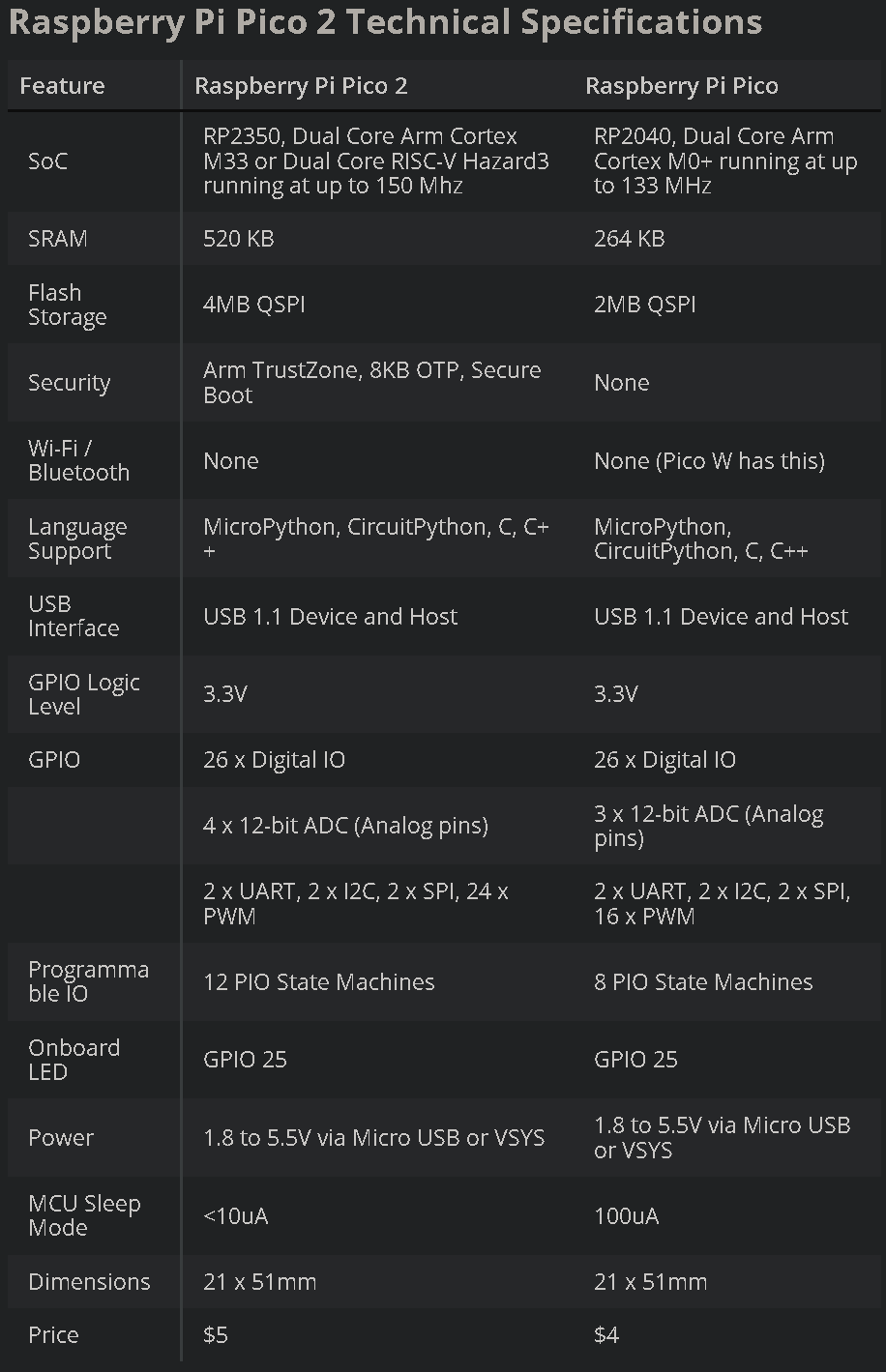SoC: RP2350, Dual Core Arm Cortex M33 or Dual Core RISC-V Hazard3 running at up to 150 Mhz | RP2040, Dual Core Arm Cortex M0+: running at up to 133 MHz
SRAM: 520 KB | 264 KB
Flash Storage: 4MB QSPI | 2MB QSPI
Security: Arm TrustZone, 8KB OTP, Secure Boot | None
Wi-Fi / Bluetooth: None | None (Pico W has this)
Language Support: MicroPython, CircuitPython, C, C++ | MicroPython, CircuitPython, C, C++
USB Interface: USB 1.1 Device and Host | USB 1.1 Device and Host
GPIO Logic Level: 3.3V | 3.3V
GPIO: 26 x Digital IO | 26 x Digital IO
Row 9 - Cell 0: 4 x 12-bit ADC (Analog pins) | 3 x 12-bit ADC (Analog pins)
Row 10 - Cell 0: 2 x UART, 2 x I2C, 2 x SPI, 24 x PWM | 2 x UART, 2 x I2C, 2 x SPI, 16 x PWM
Programmable IO: 12 PIO State Machines | 8 PIO State Machines
Onboard LED: GPIO 25 | GPIO 25
Power: 1.8 to 5.5V via Micro USB or VSYS | 1.8 to 5.5V via Micro USB or VSYS
Important note on the flash is that both chips have the same 16MB max, and 3rd party pico boards would often just use max spec. The pico 2 additionally supports PSRAM sharing the flash’s qspi
Raspberry Pi Pico 2 Technical Specifications[1]
Feature: Raspberry Pi Pico 2 | Raspberry Pi Pico
SoC: RP2350, Dual Core Arm Cortex M33 or Dual Core RISC-V Hazard3 running at up to 150 Mhz | RP2040, Dual Core Arm Cortex M0+: running at up to 133 MHz
SRAM: 520 KB | 264 KB
Flash Storage: 4MB QSPI | 2MB QSPI
Security: Arm TrustZone, 8KB OTP, Secure Boot | None
Wi-Fi / Bluetooth: None | None (Pico W has this)
Language Support: MicroPython, CircuitPython, C, C++ | MicroPython, CircuitPython, C, C++
USB Interface: USB 1.1 Device and Host | USB 1.1 Device and Host
GPIO Logic Level: 3.3V | 3.3V
GPIO: 26 x Digital IO | 26 x Digital IO
Row 9 - Cell 0: 4 x 12-bit ADC (Analog pins) | 3 x 12-bit ADC (Analog pins)
Row 10 - Cell 0: 2 x UART, 2 x I2C, 2 x SPI, 24 x PWM | 2 x UART, 2 x I2C, 2 x SPI, 16 x PWM
Programmable IO: 12 PIO State Machines | 8 PIO State Machines
Onboard LED: GPIO 25 | GPIO 25
Power: 1.8 to 5.5V via Micro USB or VSYS | 1.8 to 5.5V via Micro USB or VSYS
MCU Sleep Mode: <10uA | 100uA
Dimensions: 21 x 51mm | 21 x 51mm
Price: $5 | $4
Screenshot of Specs:
[1] https://www.tomshardware.com/raspberry-pi/raspberry-pi-pico/raspberry-pi-pico-2-launches-with-arm-risc-v-cores-hands-on-with-the-new-dollar5-microcontroller ↩︎
I wonder if the Alpakka controller can get advantage of this… Thank you and have a nice day
TIL[1]
[1] https://inputlabs.io/alpakka ↩︎
I was going to say $5 is pricy before I remembered it was dev boards and not chips.
Important note on the flash is that both chips have the same 16MB max, and 3rd party pico boards would often just use max spec. The pico 2 additionally supports PSRAM sharing the flash’s qspi